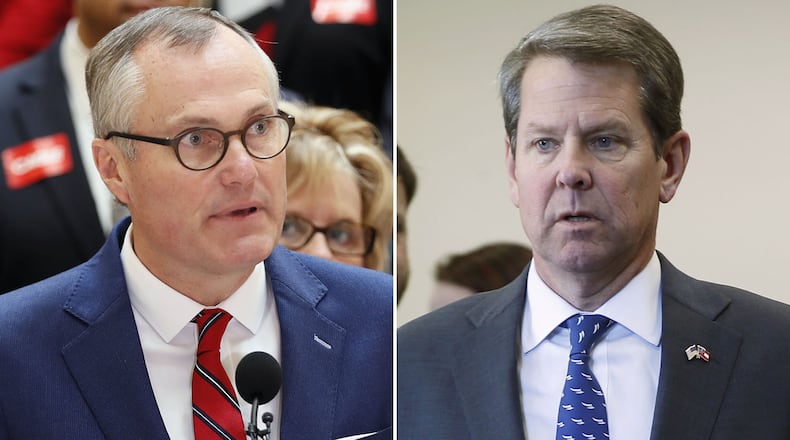The Republican picks for some of Georgia’s highest offices are at stake in Tuesday’s runoff elections. Here are the key races.
Governor
The marquee match up is between between Lt. Gov. Casey Cagle and Secretary of State Brian Kemp in the race for governor.
Cagle frames himself as a conservative standard-bearer who will take on powerful interests, and he likes to say his election will usher in an era when “conservatives getting kicked around is over.” Kemp’s campaign mantra is “putting Georgians first,” and he often touts his willingness to say politically incorrect things, ending with a catchphrase: “Yep, I just said that.”
Each secured high-profile endorsements in the last week before the election. Cagle got the support of Gov. Nathan Deal, who said the lieutenant governor is the best choice to continue the work he started.
But Kemp got the coveted endorsement of President Donald Trump, something some watching the close race called a "game changer." Vice President Mike Pence rallied with Kemp on the campaign's final weekend.
The winner of the runoff faces Democrat Stacey Abrams in November.
Lieutenant governor
Two Republicans face off for the nomination to be the next lieutenant governor after neither was able to secure a majority of the vote in May's primary.
Former state Rep. Geoff Duncan of Cumming and state Sen. David Shafer of Duluth are going head to head after a three-way race in May.
Duncan is running as an outsider after serving five years in the state House of Representatives. Shafer, who has served 16 years in the Senate, has racked up hundreds of endorsements, including one recently from Deal.
The winner will face Democrat Sarah Riggs Amico, a business executive and first-time candidate.
In addition to presiding over the Senate, the lieutenant governor will be in a position to take a leadership role in shaping the state’s policy.
Secretary of state
Voters will select between two Republicans in the runoff for secretary of state: former Alpharetta Mayor David Belle Isle and state Rep. Brad Raffensperger.
The office takes on greater significance this year because Georgia is considering replacing its 16-year-old electronic voting machines with a system with a paper backup. The secretary of state will likely be responsible for overseeing the state’s purchase and implementation of such a system. The job also includes overseeing business regulations and professional licensing.
The winner of the Republican runoff will face Democrat John Barrow, a former U.S. congressman, who won his primary in May.
How to vote in Georgia’s primaries
Election hours: Polling places are open from 7 a.m. to 7 p.m. on July 24 for the Republican Party and Democratic Party primary runoffs.
Where to vote on Election Day: Look up your voting information and view sample ballots on www.mvp.sos.ga.gov or through the GA SOS app for Apple and Android cellphones.
Who can vote: Any registered voter in Georgia can vote in the runoff election. Georgia has open primaries, which means voters can choose either party's ballot without having to register with that party. However, if you voted in one party's primary on May 22, you must vote in that runoff on Tuesday. Voters who didn't vote in May can vote in either runoff.
Voter ID: Bring photo identification, such as a Georgia driver's license, a state-issued voter identification card, a valid U.S. passport or a valid U.S. military photo ID.
Keep Reading
The Latest
Featured



